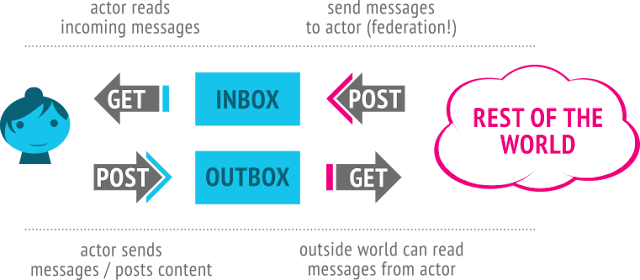Came across the below image while exploring the Threads app to see what the fuss was about and, it indicated something about the Open Social Media Protocol.
I was curios 🤔.
Given that a platform's data is its lifeblood, sharing data across social media networks seemed like a crazy concept to me.
And that too, Meta is advocating for it (while I expected them to do otherwise, lock the platform data to retain the users), made me to dig into it a bit more.
What makes the concept noteworthy is the quote from Meta that is emphasised in the paragraph below.
"We’re committed to giving you more control over your audience on Threads – our plan is to work with ActivityPub to provide you the option to stop using Threads and transfer your content to another service." Sweet.
But why are they doing it or be so lenient regarding this feature ❓
It turns out that Meta does not want people to easily switch to other platforms, but rather drive more traffic to the threads platform from it's rivals. The majority of people are already using the Threads app anyway & knows how to retain them.
So what is this protocol all about ❓
Open social networking protocols are a set of standards and protocols that aim to promote interoperability, data portability, and decentralization in social networking platforms.
These protocols allow users to interact and share content across different social networks, giving them more control over their data and the ability to connect with a broader range of users.
It is the Block Chain for Social Media.
Some examples of these protocols:
- ActivityPub: ActivityPub is a decentralized protocol for social networking. It enables different social networking platforms to federate with each other, allowing users on different platforms to follow and interact with each other. Mastodon, Pleroma, and Pixelfed are examples of platforms that use the ActivityPub protocol.
- Diaspora: The Diaspora protocol is used by the Diaspora social network. It is designed to provide users with control over their data and privacy. Users can host their own "pods" or join existing pods and connect with others across different pods.
- Zot: Zot is a protocol used by the Hubzilla social networking platform. It allows for decentralization and federation, enabling users to connect and share content across different instances of Hubzilla.
- OStatus: OStatus is a suite of open protocols that enable federated microblogging and social networking. It includes protocols like ActivityPub, WebSub, and Salmon. StatusNet and GNU social are examples of platforms that use OStatus.
- Secure Scuttlebutt: Secure Scuttlebutt (SSB) is a peer-to-peer protocol for decentralized social networking. It uses a distributed append-only log to store and share messages among peers. Patchwork and Manyverse are SSB-based social networking applications.
It's worth noting that while these protocols provide the infrastructure for open and decentralized social networking, the adoption and implementation of these protocols vary among platforms and communities.
Some platforms may use a combination of these protocols or develop their own custom protocols to achieve their specific goals of openness and decentralization.
Social media might completely replace emails one day (already happened I guess). Looks like pretty sweet idea to me if it works.
.png)


No comments:
Post a Comment